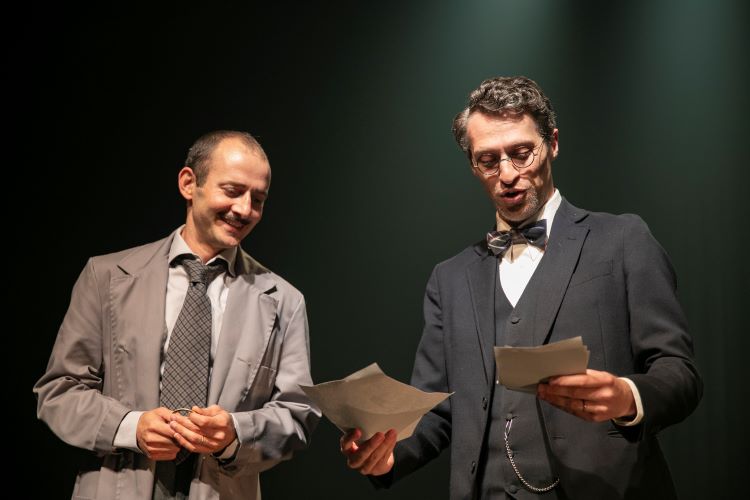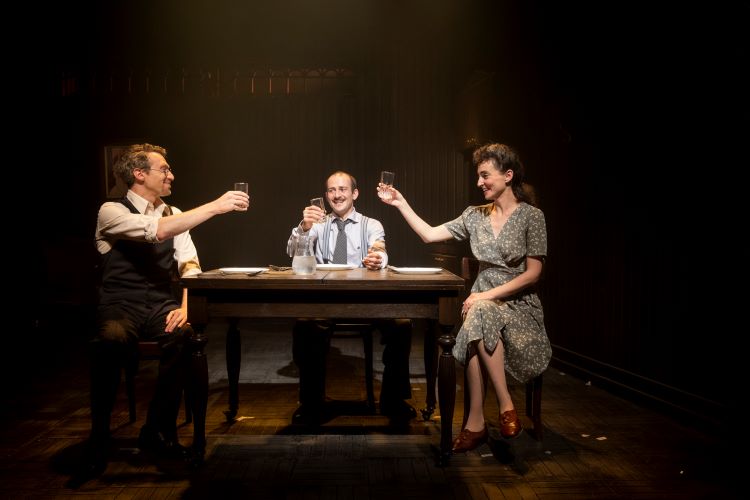Adieu Monsieur Haffmann is a moving drama that examines the impact of history on the lives of three individuals. Written by Jean-Philippe Daguerre, translated into Hebrew by Eli Bijaoui and directed by Udi Ben Moshe, the play is set in Paris of 1942, when the laws against the Jews became even harsher under the Nazi occupation. Joseph Haffmann (Vitali Friedland), the Jewish owner of a jewelry store, has successfully sent his wife and children to safety in Switzerland. But now he must find a solution for himself, and for his store. He offers his employee, Pierre Vigneau (Itay Szor) – a Catholic Frenchman, an arrangement in which Pierre will take over the store so that it can continue to function. Pierre will benefit financially from the situation, and in exchange, Haffmann asks that Pierre and his wife Isabelle (Bar Sade) hide him from the Germans.

Pierre has his own reasons for coming to an agreement with Haffmann. He and his wife desperately want to have a child, but Pierre is sterile. He asks Haffmann if he would be willing to father a child with Isabelle for Pierre and Isabelle to raise as their own. The two men make a pact, and Isabelle, although she has her doubts and fears, agrees as well.
The three are in a tense and complicated situation, impacted both by external events and the unusual personal dynamics of their trio. Pierre and Isabelle are risking their lives by harboring a Jew in occupied France, while Haffmann is entirely dependent on their loyalty to him. If discovered, he would surely be taken to a concentration camp. The terms of their pact put all three in a very vulnerable and difficult position. Although Pierre tries to be blithe and optimistic, telling Isabelle that what will take place between her and Haffmann is merely “technical,” he cannot deny that, as she says, it is also sexual. The pact and its consequences will affect them all, and in ways they did not expect.
The play raises many moral issues and questions that are not easy to answer. For example, is it morally right to benefit from another person’s hardship? Yet the play’s strength is in the way it conveys the emotional aspects of the situation. Each of the play’s characters makes choices and is affected by those choices. Excellent performances by Friedland, Szor and Sade convey the nuances of feelings and the subtle changes in their perspective over time. The character’s circumstances might have led to a melodrama, yet Udi Ben Moshe’s restrained, understated perspective on the play lets the more interesting hues of ambivalence and complexity shine through.

Adieu Monsieur Haffmann is a work of fiction, yet it is based on true historical events and refers to several historical figures. Among these is Otto Abetz, who was the German ambassador to Vichy France in World War II. Abetz is portrayed with frightening geniality by Erez Shafrir, while Nitsan Levartovsky imbues Susanne Abetz with a lively vulgarity and insensitivity that is at once amusing and repulsive.
The play opens with a tap dance, and tap is Pierre’s refuge when Isabelle is with Haffmann. The dance has several functions in the play. A talented jewelry designer, the dance affirms Pierre’s connection to the arts. It offers a form of respite for the audience as well, together with interludes of music, it lightens the atmosphere. Yet at the same time, the tap, tap, tap, of metal on the stage, emphasizes the suspense as well.
Udi Ben Moshe’s staging gives visual expression to the intricate relationships between the three protagonists. For much of the play, all three are onstage. When Haffmann first suggests the arrangement to Pierre, the two men sit at a desk on one side of the stage – which is lit, while Isabelle sits in a chair on the other, unlit, side of the stage. She is not in the scene, yet she is somehow still present. When Pierre presents the proposition to Isabelle, he walks over to her, and the lighting and focus shift to the couple. Yet Haffmann is there, standing with his back to the audience, somewhat towards the back of the stage. The staging and lighting (Roni Cohen) are a constant reminder of the way these three are entangled in a very emotional, morally challenging, ever-changing dynamic.
Adieu Monsieur Haffmann
By Jean-Philippe Daguerre
Translated by Eli Bijaoui; Directed by Udi Ben Moshe; Set Design: Adam Keller; Costume Design: Judith Aharon; Lighting: Roni Cohen; Music: Guy Levy; Tap Dancing: Eran Shimshi; Cast: Itay Szor – Pierre Vigneau, Vitali Friedland – Joseph Haffmann, Bar Sade – Isabelle Vigneau, Erez Shafrir – Otto Abetz, Nitsan Levartovsky – Susanne Abetz





